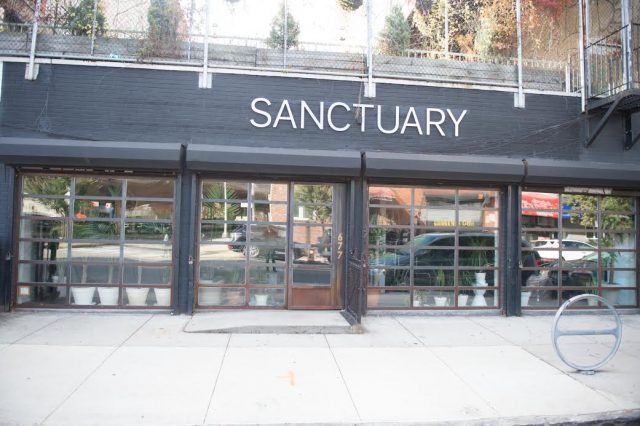
Stroll down Bedford Avenue on a nice day and the life of a street-vendor can look pretty appealing. So free, so independent, seem those hawkers of books and sellers of handmade mobiles you pass on the sidewalk. You start to wonder what it takes to make a living like this—whether street-vending just might be a viable career path. We’ve certainly wondered all this, and now, after badgering a few street vendors and hard-working public servants, the idea doesn’t seem so far-fetched. For all the enterprising New Yorkers out there with a folding table and dream, the many strings attached and city regulations are no barrier to engaging in this barely tolerated form of commerce.
Like any business, peddling isn’t for the lazy or the risk-averse. A hard worker can make good money from week to week, but only if fortune smiles. “On a good week, in the right place, with the right product, I’ll make $1,000,” says Uta Brauser, who’s been selling handmade adult’s and children’s hats, gloves and hoods for 15 years. Bad weeks are more like $200.

The Key, Uta says, is “figuring out things you can make in the least amount of time, which you can sell for a very high price.” Her hats go for between $25 and $45. The gloves, on to which she sews whimsical felt claws, sell for $18. But her overhead, at least, is low. She estimates spending just $3,000 a year on materials. “My business cost is labor,” she says, estimating a 40-hour week between making and selling her products.
Uta doesn’t have a vending license; obtaining one is a long, hard route. Each year, the city issues fewer than 900 of these to non-veterans (around 1,000 are available to those who’ve served). Competition for a food vending license is even tougher. And even those who have them are likely to answer frequent questions from the police about their business status.
But you don’t need a business license to sell certain items protected under the First Amendment. The list includes art or used books, records and DVDs—but some vendors have been successful stretching the definition a bit. Newspapers and any object with a political message are covered too.
And Uta Brauser has it pretty wired. After having seen her share of challenge from the police, she now sews a tag bearing Barack Obama’s likeness inside each item for that dose of free-speech protection.
Tony Ambro, for another, sells a seemingly random assortment of things on Bedford Ave.: old records, CDs, figurines, and a selection of religious items like Catholic medals. Religious artifacts are also free-speech protected he says, but the definition of free speech gets somewhat hazy here.
All vendors run certain risks, and those who push the boundaries of free speech protection by selling, say, hand-knitted yoga mats could be fined, receive a civil summons or even be arrested depending on an officer’s judgment call. Uta says undercover cops still give her a hard time, even with her Obama images, saying things like “you think you just stick that tag on there and have the right to be here?”

No matter what they sell, serious vendors get a tax ID number for their sidewalk business. This is from NY State, and it’s not a business license—it’s what vendors need to collect sales tax, which most do. Getting it is free, and it’s easy to register here. (For more general information about starting a business in NYC, this is a helpful tip sheet.) After about 20 days, a newly minted peddler gets a tax ID number and certificate, and must then start reporting quarterly earnings. Surely, some scofflaws skip out on paperwork entirely but they run the risk of being arrested and having their merchandise confiscated.
But, as with the business licenses, there is a loop-hole. It’s possible keep things very simple by selling tax-exempt stuff, like clothing or footwear. Uta’s got this down too. Her hats, for instance, are exempt, though she does have a tax ID number. She also has an accountant, but that may be unusual among vendors.
One of the trickiest aspects of the occupation is figuring out where to set up. Most vendors will stake out a busy shopping district, but some streets have restrictions against sidewalk vendors. And a neighborhood association with a less-than-positive attitude toward sidewalk sales is more likely to contact the police about such business.
The rules of vendery are complicated and easy to violate unwittingly. Many vendors, like Tony, seem to suss things out as they go. He has tried selling above Metropolitan Ave., but now stays well below it when he sells his assortment on Bedford Ave. Such is his relationship with the local police that members of the next precinct north helpfully suggested he move south where he sees less hassling. “If you’re just selling books, they won’t bother you, and if you’re a disabled veteran they won’t bother you,” Tony says. (He’s neither disabled nor a veteran, but a friend and sometime-partner is.) He also says that you’re much more likely to receive a summons on Saturday than Sunday.
Terrence Miele sells used books at the corner of Bedford Ave. and Grand St. Some rules, he says, like maintaining 12 feet of pedestrian space wherever you set up, aren’t always feasible. But in the end, he finds he has little to worry about unless a nearby business complains. And even then, the police don’t break his back over it, he says. “It’s just tolerated. [the police] have too much going on.” Once, an officer came to answer a complaint and told Miele, “I don’t want to come here for this. I don’t give a shit what you sell.”
The rules are so prohibitively twisted and, it seems, selectively enforced that there is a movement underway to give a little more wiggle room to those who ply this hallowed New York City trade. The Urban Justice Center’s Street Vendor Project promotes easing restrictions on vendors as a way to provide jobs by encouraging entrepreneurship at the lowest level.
Despite the unpredictable nature of life behind the folding table, there are those who will tell you they love it. Safak Aydemir is one. She sets up almost daily on the corner of Bedford and N. 6th to sell her exquisite handmade jewelry and the colorful vintage clothes she culls from thrift stores. She had a small clothing export business in her native Turkey and simply likes working for herself. “I like business,” she says.
3 Comments
Leave a Reply




Very interesting and well written.
Just
make sure you have a vendors permit,(which)they only give to U.S. Veterans who PAID THERE DUES.So if you dont have a permit ,join the service and when you come out they will gladly issue you one………….GOOD LUCK.